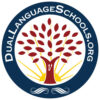Dismissing Misconceptions on Dual Language Programs: January Book of the Month: Why Dual Language Schooling by Virginia Collier


The importance of a dual language education is not going unnoticed. More than ever before, schools and districts are realizing how beneficial a dual language education can be for both their students and communities, and beginning the conversation of implementing one in their district if desired; this has prompted parents to ask questions regarding such programs. Wayne Thomas and Virginia Collier, two esteemed advocates within the dual language community, hope to answer such questions in their new book Why Dual Language Schooling, explaining the basis of dual language programs and their unique benefits. The book holds the ‘short version’ as to why dual language education schooling works so well.
We wrote [Why Dual Language Schooling] thinking of school board members, superintendents, policymakers, and parents who want to get a picture in a fairly short time of how this particular form of schooling works – Collier and Thomas
The authors found that there are a core set of questions that are continuously asked by those who are not familiar with a dual language program, especially parents. Rather than have the districts or schools of the families holding these questions provide answers over and over again, Why Dual Language Schooling acts as a one-stop-shop for all answers that may be asked surrounding a dual language program.
Thomas and Collier have written many books regarding dual language schooling providing proof through research of the benefits that these programs provide for not only students and families, but communities. As a whole, their collective research is summed up concisely in their new book, in hopes that families will find answers to their questions and concerns within it.
The authors were requested by many districts to come visit and meet with communities to discuss dual language programs and answer any concerns that parents and community members may have; schools found that, psychologically speaking, questioning groups of people will believe the facts when heard from advocates like Thomas and Collier versus the school district. This notion acted as another reason and motivation to answer the commonly-asked questions in a simple format of a book.
Continue to the next page to learn more about Why Dual Language Schooling …
Students and communities are not the only groups that benefit greatly from a dual language education; parents receive great benefits as well. In fact, in their book, Thomas and Collier have dedicated two chapters addressing issues that parents may have, providing research and evidence alongside the benefits as well.
Developing bilingual skills are especially crucial for families who are new arrivals within the country and are trying to decide what’s right for their kids. Many times, their first concern is to learn English as they’ve got to start surviving in the new place. So given the options, sometimes they really don’t understand why bilingual schooling is so important for their children. And so these chapters explains in short form what the main issues for why it’s so important for their kids to be educated in their home language as well as in English.
One of the hallmarks of their research is that dual language is also not only very effective for English learners, but it’s also quite effective for certain groups of native English speakers who historically have not done well in school. And so in a two-way dual language program, you might have students that in the past would be in a title one program or even a special needs program, and those parents think twice about whether a special language program as good for their student who already is not performing well in school. Should they really be in dual language and it usually comes out in some form or another similar to my kid’s not doing so good right now, and you teach them in one line which house teaching him into line, which is going to help that and so that’s a question that we often encounter from the English speaking parent , the upper middle and middle class, native English speaking.


According to Collier and Thomas, parents who are well educated and well-traveled don’t need any convincing at all; it’s the other native English-speaking parents and many parents of English learners who really need to have the full explanation about why this is not just a good thing for somebody else’s kid.
Continue to the next page to learn more about Why Dual Language Schooling …
The programs are just as beneficial for non-native English speakers as they are for native English speakers. Students in these programs, both English speakers and English learners, do significantly better than their peers whom are not enrolled in a dual language program, and it seems to have a lot to do with the type of teaching that’s done in dual language classes. Here, teachers are proven to be very innovative, as they must provide clues of meaning beyond what the typical teacher does for their students; specifically, they have strategies for teaching second language learners.
Virginia Collier notonly speaks as an advocate and researcher, but also as a parent to a former dual language educated student. Collier spent five years of her childhood in Central America, yet it never occurred to her to send her children through a dual language program. It wasn’t until a program was initiated in their community when she got involved. She recalls having an incredible experience with wonderful teachers and a strong, close-knit community of parents. Likewise, her daughter is thriving professionally, and has been able to use her bilingual language education to make advances in her career.


With the current political climate and all that has been occurring with immigration and DACA, it is an interesting time for dual education programs and advocates, as the federal government is not very supportive of immigrant students; this, in turn, has created negative attitudes surrounding a dual language education. However, Collier and Thomas share an interesting perspective on the case.
From their perspective, the federal government – and the administrations in office within the past 20 years – has been distant and indifferent to bilingual programs; they believe that the reason behind this is because in the US Constitution, education is not an enumerated federal power. The 10th amendment states that if someone is not explicitly mentioned as federal duty in the constitution, then it is reserved to the people and the states; hence, education matters are decided at the state level. The federal government only contributes about seven or eight percent of total funding towards education, and the rest is by the state.
There is an English-only movement that is much less active as it has been in the past, and in place bilingualism is becoming incredibly popular in many states. Unfortunately, though, there is a huge bilingual teacher shortage nationally. That being said, people are still stepping up and bringing new leadership to the front. There is a strong attitude in favor of bilingual education, an attitude that has changed drastically within the past two decades.
Continue to the next page to learn more about Why Dual Language Schooling …
Thomas and Collier believes that the book will have an appeal towards all readers, as it is written in a way that everyone can understand that matter and messages of the book. A big takeaway that the two authors hope families can grapple with is that every group who has received a well-executed, well implemented dual language program has done better than that same group who was in their traditional forms of instruction; the differences between the two performances are incredible.
It’s important to [us] that parents understand that whatever group they’re child may fall into, that child is going to almost certainly do better in a dual language program that he or she would in even the educational mainstream. Research proves that there is increased and accelerated cognitive development and higher student engagement in students who enroll in a dual immersion program versus a traditional education.
Why Dual Language Schooling hopes to address the concerns of all, especially parents, when choosing an education for their children. Thomas and Collier hope that the informal-yet-professional tone of their book will allow for all readers to understand the benefits and importance of a dual language education for all. Thomas and Collier are very passionate advocates of dual language education, and hope that their new book will lead parents to choose a dual language education for their children.



